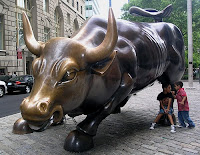The Death of Fancy ETFs
| August 6, 2008 | Posted by Roshawn Watson under Uncategorized |
Comments off
|
Image Credit: ringydingydo
However, over the past few years, a troublesome trend has emerged: too many ETFs. More specifically, it is the proliferation of over-specialized (sub-sector specific) ETFs. Currently, there are almost 800 ETFs, but nearly half of these funds have less than $50 million in assets, which means they will likely lose money for their sponsors.
According to investment columnist Jason Zweig, this means that almost half of all ETFs are too small to survive and will fail.
When an ETF Fails
There are two primary options when an ETF fails: (1) liquidation and (2) fund merger.
- Liquidation – When an ETF liquidates, it sells its portfolio and gives investors back the net asset value in cash. This has tax implications if you have capital gains because you could have otherwise deferred these taxes. Note that your brokerage account typically receives the proceeds from a liquidation within three days.
- Fund Merger – Generally, when a fund merges with another, it is with a larger ETF. Within three days after a merger, your brokerage account should have the equivalent dollar amount in shares from the other fund.
So far this year, 25 funds have shut down. “All distributed their full net asset value to shareholders without any glitches (or commission charges)” according to Jason.
One potential problem with mergers is that investors often end up with a different fund than they started with.
Considerations
Generally, big portfolio’s with ETFs from larger sponsors (i.e. Vanguard Group, Barclay’s Global Investors) are less likely too fail than ETFs that contain less than $50 million in assets.
Also, do not pay to get out. If you do own an ETF that is shutting down, you have the rare opportunity to get cashed out without any brokerage commissions. If your fund holds liquid securities, your portfolio can be cashed out rather quickly, as you might suspect. It’s ETFs with illiquid securities present the challenges.
Final Thoughts
Perhaps the most important point is to evaluate the true purpose of ETFs in the first place. They are great for diversification at low costs but not for overspecialization in general. Just because an ETF is available doesn’t make purchasing it wise. If you truly want to specialize, then learn how to pick the best of breed (very, very challenging). Speculation is nothing more than gambling, so dominate your turf! Do not lose the primary value (cheaper diversification) by investing in overspecialized ETFs that get canned anyway.
Lastly, if you like this post, please click here to get my Brand New eBook FREE and Propel it, Stumble it, and tag it on Delicious.
Copyright 2008, Roshawn Watson, Pharm.D. All Rights Reserved.
Related Posts
Investment Check-Up: Are You Ready?
Copyright 2012, Roshawn Watson, Pharm.D., Ph.D. All Rights Reserved.








Recent Comments